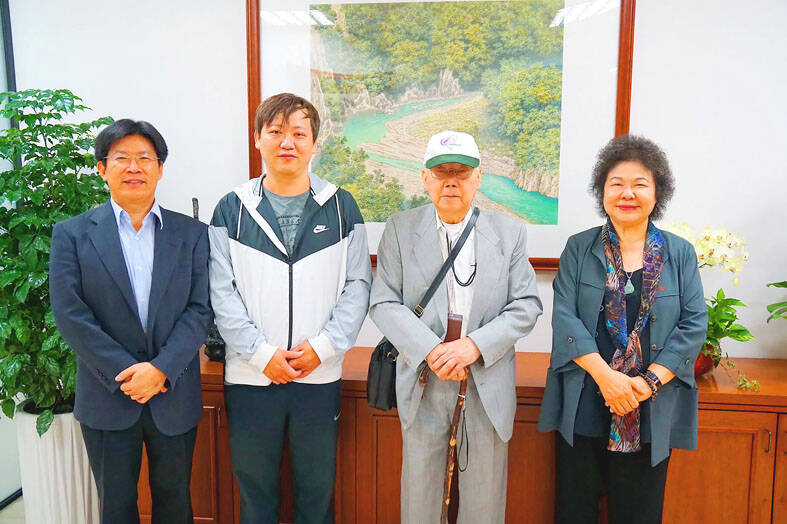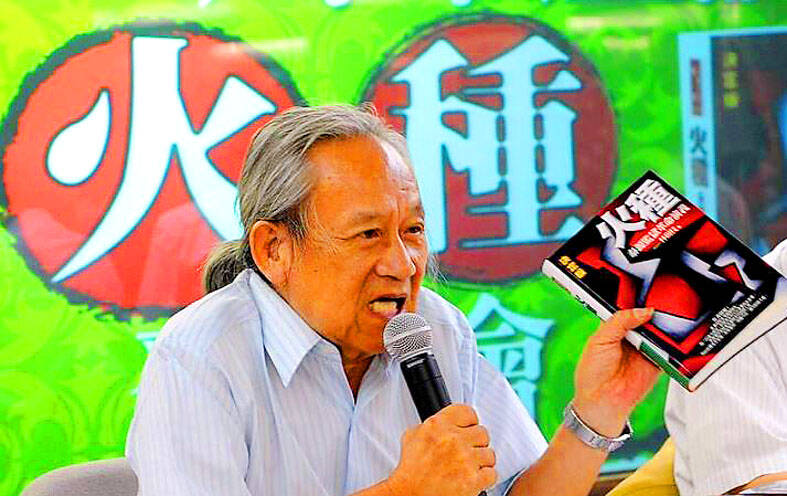Prominent Taiwanese independence activists Lin Shui-chuan (林水泉) and Lin Shu-chih (林樹枝) passed away this month.
Lin Shui-chuan, 86, a democracy and independence movement trailblazer, died after a fight with illness in Los Angeles on Aug. 3, his family said on Tuesday.
He was the central figure related to a landmark case that set the precedent for victims of the White Terror to demand exoneration and compensation.

Photo courtesy of Lin Shui-chuan’s family via CNA
Lin Shui-chuan had long sought exoneration and state compensation for being imprisoned during the Martial Law era on charges that he said were manufactured to silence criticism and prevent electoral competition against the then-ruling Chinese Nationalist Party (KMT).
In 1961, Lin Shui-chuan ran as an opposition candidate to the KMT and criticized the party’s authoritarian rule. He was arrested and declared a “thug,” which enabled the authorities to imprison him for 20 months without trial by using special police powers granted by martial law.
Three years after being sent to prison for the first time, Lin Shui-chuan was elected a Taipei City councilor, but was arrested for conspiracy to subvert the state before he could finish his first term. He served a sentence of 10 years in prison.

Photo: Taipei Times
The Transitional Justice Commission in 2000 voided Lin Shui-chuan’s guilty sentence for subverting the state, but said that it lacked the mandate to dispose of administrative detention as stipulated by the Compensation Act for the Wrongful Trials on Charges of Sedition and Espionage during the Martial Law Period. (戒嚴時期不當叛亂暨匪諜審判案件補償條例)
In March, the Ministry of Justice, which later took over the review of cases from the commission with a broadened mandate, said the ruling that Lin Shui-chuan was connected to organized crime was also illegal.
Lin Shui-chuan’s case enabled others who suffered the loss of life, freedom, or property from acts authorized via special police powers to seek redress, Lin Shui-chuan’s family members said.
“Lin was vilified by the KMT for the first half of his life. Thanks to the government, he was rehabilitated in the second half of it and could face death knowing his dignity is intact,” they said.
Separately, Taiwanese independence advocate and White Terror victim Lin Shu-chih, 77, was on Aug. 14 found dead in his apartment in New Taipei City’s Tamsui District (淡水).
He was discovered by his friend and photographer Chiu Wan-hsing (邱萬興), who became worried as he was unable to reach Lin Shu-chih since the previous evening, Chiu said in a Facebook post later that day.
In 1971, Lin Shu-chih went to jail for the first time after accusing the KMT of corruption in a private missive to a friend, for which he was sentenced to 10 years in prison, and he served 80 months of that sentence, with the rest being commuted in 1975 when Chiang Kai-shek (蔣介石) died, Chiu said.
Two years after his release, Lin Shu-chih helped opposition politicians evade the crackdown following the Kaohsiung Incident in 1977, where soldiers and police suppressed a peaceful demonstration and used it as a pretext to neutralize prominent dissenters, Chiu said.
In 1980, Lin Shu-chih was convicted of sedition for giving aid and comfort to a known traitor and withholding information about a spy from the authorities, Chiu said, adding that he was sentenced to five years and four months in prison, with the formerly commuted sentence added.
Lin Shu-chih was tortured during both periods of incarceration, including being hit with truncheons while suspended in a sack, which broke all of his teeth, and being electrocuted in the genitals, which left him infertile, Chiu said.
Following the end of the martial law, Lin Shu-chih became a collector and editor of oral histories of the White Terror and a founding member of the Democratic Progressive Party (DPP), and played a role in human rights and transitional justice advocacy, Chiu said.

The first global hotel Keys Selection by the Michelin Guide includes four hotels in Taiwan, Michelin announced yesterday. All four received the “Michelin One Key,” indicating guests are to experience a “very special stay” at any of the locations as the establishments are “a true gem with personality. Service always goes the extra mile, and the hotel provides much more than others in its price range.” Of the four hotels, three are located in Taipei and one in Taichung. In Taipei, the One Key accolades were awarded to the Capella Taipei, Kimpton Da An Taipei and Mandarin Oriental Taipei. Capella Taipei was described by

EVA Airways today confirmed the death of a flight attendant on Saturday upon their return to Taiwan and said an internal investigation has been launched, as criticism mounted over a social media post accusing the airline of failing to offer sufficient employee protections. According to the post, the flight attendant complained of feeling sick on board a flight, but was unable to take sick leave or access medical care. The crew member allegedly did not receive assistance from the chief purser, who failed to heed their requests for medical attention or call an ambulance once the flight landed, the post said. As sick

The Taichung District Court yesterday confirmed its final ruling that the marriage between teenage heir Lai (賴) and a man surnamed Hsia (夏) was legally invalid, preventing Hsia from inheriting Lai’s NT$500 million (US$16.37 million) estate. The court confirmed that Hsia chose not to appeal the civil judgement after the court handed down its ruling in June, making the decision final. In the June ruling, the court said that Lai, 18, and Hsia, 26, showed “no mutual admiration before the marriage” and that their interactions were “distant and unfamiliar.” The judge concluded that the couple lacked the “true intention of

INDUSTRY: Beijing’s latest export measures go beyond targeting the US and would likely affect any country that uses Chinese rare earths or related tech, an academic said Taiwanese industries could face significant disruption from China’s newly tightened export controls on rare earth elements, as much of Taiwan’s supply indirectly depends on Chinese materials processed in Japan, a local expert said yesterday. Kristy Hsu (徐遵慈), director of the Taiwan ASEAN Studies Center at the Chung-Hua Institution for Economic Research, said that China’s latest export measures go far beyond targeting the US and would likely affect any country that uses Chinese rare earths or related technologies. With Japan and Southeast Asian countries among those expected to be hit, Taiwan could feel the impact through its reliance on Japanese-made semi-finished products and